As of 2015, the City of Chicago produced nearly 55 million pounds of food waste, a staggering amount of food scraps for a city with fewer than three million people!
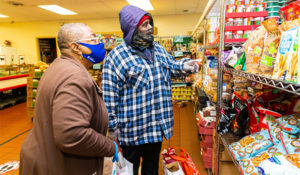
Source: chicagosfoodbank.org/
Across the state of Illinois, that figure rises to a massive 19 million tons of food waste going directly to landfill as of 2019, and with each American generating around 20 pounds of food waste each month according to the US Department of Agriculture (USDA), it’s clear that food waste is a problem in Chicago.
The USDA estimates that between 30 to 40% of all food produced is trashed, either at the production, commercial and retail, or individual consumer level. That’s more than $160 billion worth (more than $2 trillion worldwide) each year. This is at a time when the Greater Chicago Food Depository estimates that one in six Cook County residents suffers from food insecurity.
To make matters worse, waste reduction and management in Chicago has faced numerous issues over the past decade, and while privately operated curbside composting programs are on the rise, the City of Chicago has not provided a solution. What is Chicago doing about food recycling in the city, and how can you or your business successfully divert organic waste and kitchen scraps away from landfill?
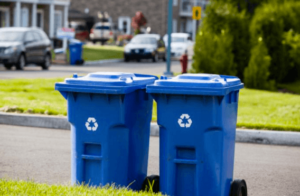
Source: zerowaste.com
The problem with recycling and food waste in Chicago
As much as 20% of all waste produced by Chicagoans each year is food waste, the majority of which ends up in landfill. Here it can become a serious problem. As it decomposes it produces greenhouse gas emissions such as methane, which is up to 25 times more harmful than carbon dioxide when allowed to enter the atmosphere.
To date, Chicago has struggled with recycling. Only 8% of all waste is recycled in the city, compared to a little under 80% in San Francisco, for example. The national average hovers around 32%, so it’s clear that the Chicago area could be doing more to keep waste out landfill.
This is especially true of food waste. The city’s Blue Cart recycling program currently does not accept food waste in any form. In fact, Chicago currently has no citywide food recycling program, leaving a collection of community and private organizations to fill the void.
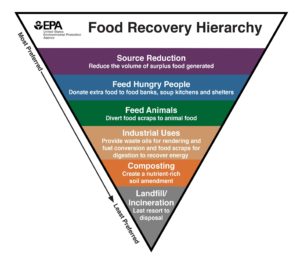
Source: epa.gov
Food waste recycling in Chicago — How to tackle it?
The key to solving Chicago’s food waste problem is to see landfill as the last resort rather than the only destination. As with the EPA’s food waste pyramid, each band of the pyramid represents an opportunity to reuse, recycle, and rescue waste, with only the bottom, smallest point of the triangle going to landfill.
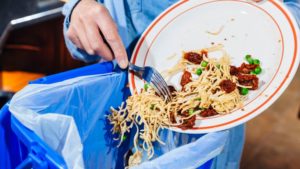 The various stages of dealing with food waste before landfill.
The various stages of dealing with food waste before landfill.
The best way to recycle food waste? Reduce it!
Reducing the overproduction of food at a commercial level is key. However, it is also true that food production is a delicate balance, with surplus often being unavoidable. A change in attitudes, purchasing, and consumption methods can help to address this at an economic level. Essentially, buy less, waste less. This can help to reduce the demands on food producers.
Reducing food waste in the home is also extremely important, as in most Western countries, the largest proportion of waste occurs here. Buying only what you need is important, with proper storage and preparation also key. Even something as simple as ensuring leftovers are eaten can make a huge difference to keeping food waste out of landfill—and you’ll find plenty of ideas on how to do that here.
Food waste organizations in Chicago – How to recycle leftover food
The next level down on the pyramid is reuse. Once an excess of food has been produced, either at commercial, retail, or personal level, donation should ideally be used to solve the food insecurity issue.
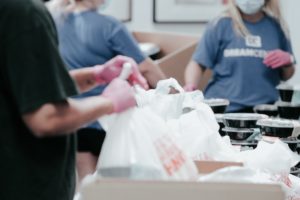 Both businesses and private citizens can donate excess and non-expired food to local food banks and pantries to help food-insecure Chicago residents—some may even offer collection services. This can include prepared and unprepared food, but it’s always a good idea to coordinate ahead of time with food banks to ensure food can be used.
Both businesses and private citizens can donate excess and non-expired food to local food banks and pantries to help food-insecure Chicago residents—some may even offer collection services. This can include prepared and unprepared food, but it’s always a good idea to coordinate ahead of time with food banks to ensure food can be used.
It’s also important for businesses to know about the Good Samaritan Food Donation Act, which protects donors from liability in most cases. This means businesses can confidently reduce food waste through donations, either to individuals or organizations.
An estimated 68% of all food discarded is considered still edible, so delivering overproduction and excess to where it is needed is a useful step in the recycling process. This includes organizations such as the Greater Chicago Food Depository that runs programs and services to end hunger in the city.
Here are a few more Chicago-based food bank organizations you can use:
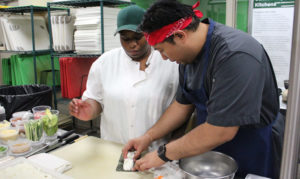
Source: chicagosfoodbank.org
- Marillac House Food Pantry
- 2859 W Jackson Blvd
- St Cyprian’s Food Pantry
- 6535 W Irving Park Rd
- Pilsen Food Pantry
- 1850 S Throop St
 Food waste as an alternative energy solution
Food waste as an alternative energy solution
The next best step for recycling food waste in Chicago is to divert it from landfill towards energy creation. Anaerobic composters act as oxygen-deficient systems of decomposition, capturing methane in a regulated way to be used as a more sustainable energy source. The solid by-product can also be used as a powerful fertilizer where nutrients from waste food are restored to the soil.
In August 2020, $32 million dollars was pledged for investment in an anaerobic digestor site in the Auburn Gresham neighborhood. It’s run by Green Era Sustainability and is expected to process 85,000 tons of food waste and organic matter every year – a positive step but just a fraction of what is needed.
How to recycle food waste in Chicago — Composting
Food waste that is unsuitable for reuse or energy recovery through anaerobic digestion can still be diverted away from landfill and used to create compost. This can be done at home if space is available or through community compost drop-off sites or compost collections. A study by UIC found that a mixture of backyard and local composting initiatives could help to divert up to 25% of the food waste generated in the city from landfill.
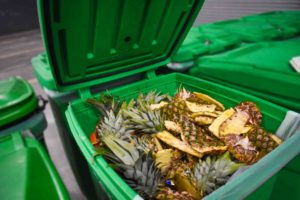
Source: rts.com
In the absence of a city-wide food recycling scheme, the responsibility is on residents and local communities to compost. However, the Illinois Food Scrap Coalition is one such organization working towards reducing food waste by raising awareness about composting and pushing for better compost programs from municipalities in the state.
At the moment, local home composting services cost between $10 to $40 a month depending on how often pick-ups are required. Alternatively, you can take your scraps to a local drop-off compost service. Several farmer’s markets and community gardens associated with The Urban Canopy take food and yard waste, while Green City Market also has a number of composting drop-offs, which you can find here.
It is always best to check when they are collecting and the types of organic material they accept before you go. In general, the following is accepted for composting:
- Fruits, vegetables, and eggshells
- Coffee, tea, and nuts
- Dried flowers and houseplants
- Bread, grains, and pasta
- Meat, fish, and dairy
Commonly not accepted items include:
- Pet waste and kitty litter
- Medical waste, diapers, and personal hygiene products
- BPI-certified compostable plastic products
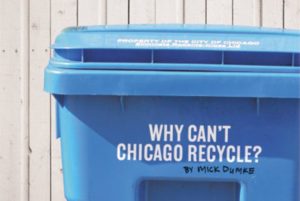
Source: chicagoreader
How to manage food waste in Chicago — Advice for businesses
Businesses can play an important role in reducing food waste, and some cities in the US such as New York and Boston have mandated businesses to use approved haulers and pick-up services to deal with any food waste generated. In Chicago, this is not the case, however, in the absence of a government-led initiative to recycle food waste, businesses can still play their part—boosting their eco-credentials and taking the lead in a city that needs zero-waste leaders!
For businesses that wish to engage food waste management services in Chicago, RTS is available to organize collections and monitor diversion using approved haulers—either on-demand or on a regular basis. We provide reliable, transparent, and sustainable services to help you work towards furthering your sustainability goals, something that can make a real statement in a city like Chicago.
For more information on how your business can reduce food waste, or optimize your existing waste management operations and, contact our TRUE advisors today. Additionally, subscribe to the RTS blog for more information on sustainable materials, waste reduction, and recycling.


